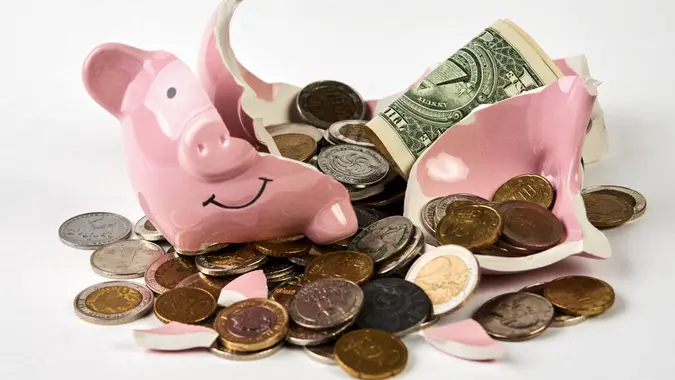I’m a Banking Expert: 5 Things To Do If Your Savings Account Earns Over $100 per Year

Commitment to Our Readers
GOBankingRates' editorial team is committed to bringing you unbiased reviews and information. We use data-driven methodologies to evaluate financial products and services - our reviews and ratings are not influenced by advertisers. You can read more about our editorial guidelines and our products and services review methodology.

20 Years
Helping You Live Richer

Reviewed
by Experts

Trusted by
Millions of Readers
If you’re like most people, you’re probably too busy earning money to figure out how to manage it. In a best-case scenario, most frugal individuals will put some extra earnings in a standard savings account and the rest towards bills and other expenses — then call it a day. After all, saving anything is a net positive, right?
Well, it’s a start. But that savings account is earning interest… and there are ways to make that interest work for you. So don’t sleep on them!
GOBankingRates spoke with Marisol Roman-Serrano, relationship advisor at Addition Financial, to learn five things to do if your savings account earns more than $100 annually.
Ensure Savings Are in a High-Yield Account
Not all savings accounts are created equal. There are standard savings accounts and then there are high-yield savings accounts (HYSA).
A standard savings account, on average, has a 0.42% APY, which means earning $100 or more in interest would require you to have roughly $25,000 in savings. A high-yield savings account with a 4% APY, however, would only require you to have $2,500.
Who would want $25,000 just sitting in a standard account, earning very little?
Roman-Serrano advised, before doing anything else, ensure your savings are taken out of a standard savings account and placed into a high-yield savings account.
“Think of this as really putting your money to work,” she said.
A high-yield account will speed up the process of helping your funds grow. Now, you are off to the races.
Repay High-Interest Debt
“There are two types of interest: the one you earn and the one you pay,” Roman-Serrano explained. “By using the [earned] interest to pay down your debt even faster, this can help you save more money in the long run.”
That’s because, like earned interest, owed interest compounds — resulting in more money owed the longer you take to pay it off. This is particularly true for high-interest debt, like that from credit cards and payday loans.
If the interest rate on debt owed is higher than the rate of return on your HYSA, the debt negates what you are earning in savings, so it makes sense to prioritize using some earned interest to pay that debt off.
Not only can repaying high-interest debt in a timely fashion help ensure the health of your credit score, but it will shore up more money to eventually put back into either your high-yield savings account or other investments.
Invest
An excellent way to make your money work for you is by investing it in either a brokerage or retirement account.
“Think of this as planting the seeds for future wealth,” Roman-Serrano said. “You can really build on earning more bang for your buck. Retirement accounts can also come with different tax benefits to help you save even more, in addition to helping your nest egg grow. There are many different options when it comes to investing, depending on your goals and risk tolerance, so it’s important to do research.”
And, yes, risk tolerance is crucial to remember. While investing in the stock market can result in earning a lot of money, it can also result in losing a lot of money — and some can’t afford that.
Finance expert at Clearsurance Melanie Musson recommended keeping $10,000 in liquid assets available for emergencies in your high-yield savings account and then investing the rest.
Prepare for Tax Season
Roman-Serrano explained people typically view interest earned as extra money they just get to keep — not so.
While most is kept, earned interest is seen as income in the eyes of the IRS — meaning it’s taxed. So budget accordingly, and don’t forget to set some aside for Uncle Sam.
Additionally, this deduction shouldn’t discourage individuals from searching for higher rates of return on savings accounts.
“You still gain more than you pay,” Roman-Serrano said.
The highest income tax bracket is 37%, so even if you paid that full 37% tax rate on your $100 — unlikely, given that tax rate is charged on only income over $626,350 in 2025 — you’d still come out $63 dollars ahead. With a more likely tax rate of, say, 22%, you’d keep $78.
Treat Yourself
It’s important to reward yourself every now and again for your diligence and hard work, which is why Roman-Serrano said once your budget is on lock and your money is “growing on autopilot,” it’s OK to put interest earned toward enjoying the little moments in life… just as long as they align with your budget.
After all, positively reinforcing your hard work throughout the year will only encourage you to keep it up!
 Written by
Written by  Edited by
Edited by 

























